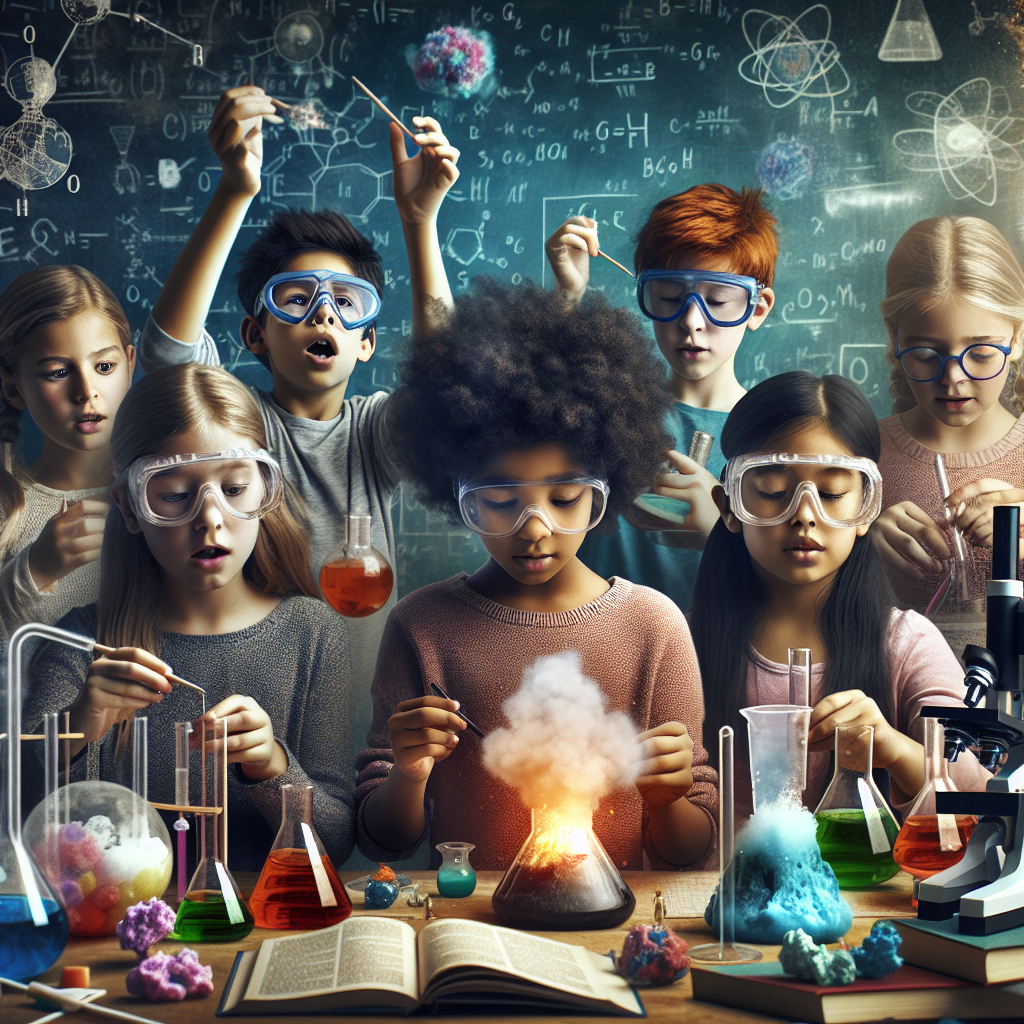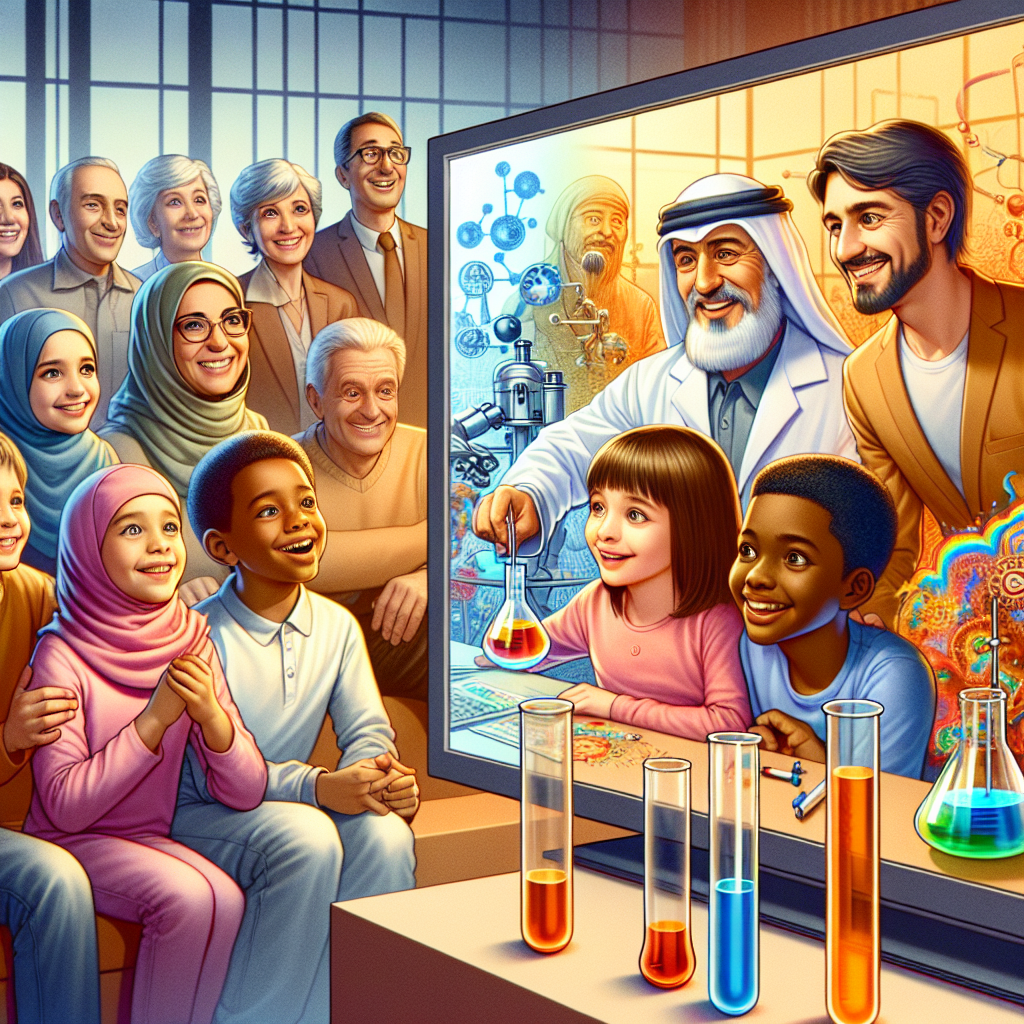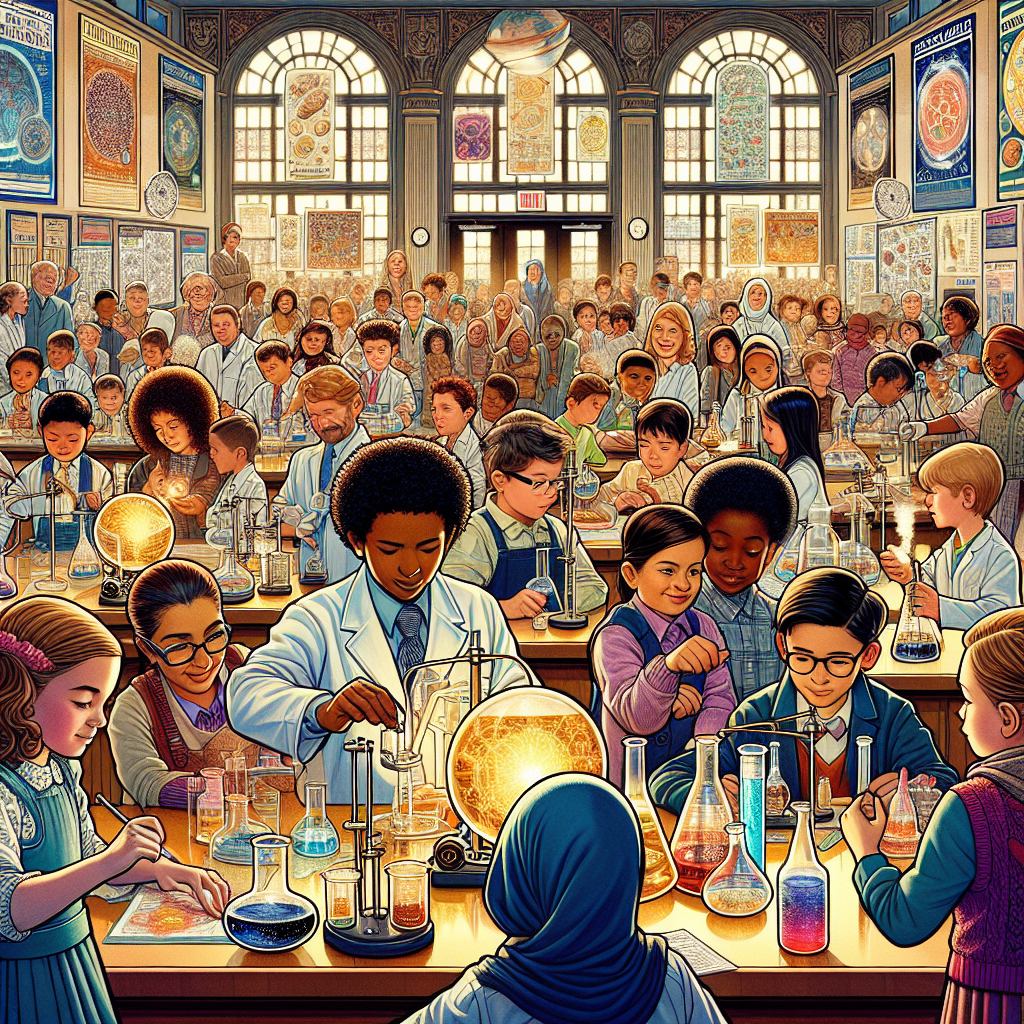In today’s fast-paced world, educational shows with experiments have become a popular tool for engaging and inspiring curious minds of all ages. These shows combine entertainment with learning, offering viewers a hands-on approach to understanding complex concepts. From exploring the wonders of science to unraveling the mysteries of mathematics, these shows stimulate curiosity and spark a passion for discovery. In this comprehensive guide, we will delve into the impact of educational shows with experiments, exploring how they cultivate critical thinking skills, foster a love for learning, and inspire future innovators. Join us on a journey of exploration and discovery as we unlock the potential of educational entertainment.
The Importance of Educational Shows in Learning

Educational shows play a crucial role in facilitating learning by offering a captivating and engaging platform for viewers to delve into complex concepts. These shows go beyond traditional teaching methods by leveraging visual and auditory stimuli to enhance comprehension and retention. By presenting information in a visually appealing manner, educational shows cater to various learning styles, making it easier for audiences to grasp and internalize new information.
Incorporating experiments into educational shows elevates the learning experience by providing real-world applications of theoretical knowledge. Experiments allow viewers to witness scientific principles in action, fostering a deeper understanding of the subject matter. By actively involving the audience in hands-on demonstrations, educational shows encourage curiosity, critical thinking, and problem-solving skills. Moreover, experiments spark interest and excitement in learning, motivating viewers to explore and discover more about the world around them.
Educational shows also play a pivotal role in promoting STEM (Science, Technology, Engineering, and Mathematics) education. By showcasing the practical applications of STEM concepts through experiments and demonstrations, these shows inspire viewers to pursue careers in these fields. Additionally, educational shows help break down stereotypes and misconceptions about STEM subjects, making them more accessible and appealing to a diverse audience. Through engaging storytelling and interactive learning experiences, educational shows contribute to building a strong foundation of knowledge and skills essential for success in STEM-related disciplines.
Understanding the Benefits of Experimental Learning
Hands-On Experience
Engaging in experiments offers viewers a unique opportunity to bridge the gap between theory and practice within an educational setting. This practical involvement allows individuals to not only observe scientific concepts but to actively participate in their exploration and application, leading to a more profound comprehension of complex ideas. Through hands-on experience, educational shows with experiments enable audiences to:
- Apply Theoretical Knowledge: By physically engaging with experiments, viewers can directly apply the theoretical principles they have learned, reinforcing their understanding and retention of information.
- Develop Critical Thinking Skills: The hands-on nature of experiments encourages individuals to think critically, analyze outcomes, and draw conclusions based on their observations, fostering a deeper level of cognitive engagement.
- Enhance Problem-Solving Abilities: Actively participating in experiments challenges viewers to solve problems in real-time, honing their problem-solving skills and encouraging creative thinking in the process.
- Promote Active Learning: Rather than passively receiving information, hands-on experience encourages active learning, where individuals are motivated to explore, question, and discover, leading to a more immersive educational experience.
In essence, the hands-on experience provided by educational shows with experiments serves as a catalyst for meaningful learning experiences that go beyond traditional didactic methods, empowering viewers to become active participants in their educational journey.
Critical Thinking Skills
- Encouraging Analytical Thinking: Educational shows with experiments prompt viewers to engage in analytical thinking by presenting them with real-life scenarios and challenges that require logical reasoning to solve.
- Predicting Outcomes: Through experiments showcased on these shows, viewers are encouraged to make predictions about the expected results based on the presented information and their prior knowledge, fostering the ability to anticipate outcomes.
- Analyzing Results: Viewers are guided to analyze the results of the experiments conducted on the show, encouraging them to interpret data, identify patterns, and draw conclusions based on evidence presented, thus enhancing their analytical skills.
- Developing Problem-Solving Skills: By engaging in experimental learning through educational shows, viewers are exposed to various problem-solving strategies, teaching them how to approach challenges systematically and think creatively to find solutions.

Analyzing the Impact of Educational Shows on Cognitive Development
Cognitive Engagement
- Educational shows with experiments engage viewers cognitively by presenting information in a visually stimulating manner.
The inclusion of experiments in educational shows provides a hands-on learning experience that captivates viewers’ attention and encourages active participation in the learning process. By witnessing experiments unfold on screen, viewers are more likely to engage with the content on a deeper level, leading to enhanced cognitive processing of the information presented.
- Interactive elements in educational shows with experiments facilitate cognitive processes such as attention and memory.
Viewers are prompted to focus their attention on the experimental procedures and outcomes, which helps strengthen their cognitive skills. The interactive nature of experiments, where viewers may be asked to predict results or analyze data, further enhances engagement and boosts memory retention. This cognitive engagement contributes to the overall effectiveness of educational shows in promoting learning and knowledge acquisition.
Encouraging Curiosity
Exposing viewers to hands-on experiments within educational shows plays a pivotal role in fostering curiosity among individuals of all ages. By showcasing practical demonstrations and engaging experiments, educational programs captivate audiences and stimulate their inquisitiveness about the world around them. Through interactive and visually compelling content, these shows ignite a sense of wonder and encourage viewers to question how things work, why phenomena occur, and what principles govern the natural laws.
Nurturing curiosity through educational shows leads to a cascade of positive effects on cognitive development. When individuals are curious, they are more likely to actively seek out information, engage in critical thinking, and persist in problem-solving tasks. This intrinsic motivation to learn fuels a continuous cycle of exploration and discovery, ultimately deepening one’s understanding of complex scientific concepts. Curiosity-driven learning not only enhances retention and comprehension but also instills a lifelong passion for learning and a mindset geared towards growth and intellectual development.
Exploring Popular Educational Shows with Experiment Segments
“Bill Nye the Science Guy”
- Impact of “Bill Nye the Science Guy” in popularizing science education:
- “Bill Nye the Science Guy” played a significant role in popularizing science education among children and adults alike through its engaging and entertaining approach to exploring scientific concepts.
- The show successfully combined humor, demonstrations, and experiments to make complex scientific topics accessible and enjoyable for viewers of all ages.
-
Bill Nye’s charismatic personality and enthusiastic teaching style captivated audiences and helped foster a love for science in many individuals.
-
Experiments featured on the show and their educational value:
- The experiments showcased on “Bill Nye the Science Guy” were carefully selected to not only entertain but also educate the audience on fundamental scientific principles.
- Each experiment was designed to be replicable at home or in a classroom setting, encouraging hands-on learning and exploration.
- By engaging viewers in interactive experiments, the show effectively reinforced key scientific concepts and promoted critical thinking skills among its audience.
“MythBusters”
“MythBusters” is a renowned educational show that captivates audiences with its unique blend of entertainment and scientific experiments. The show’s success lies in its ability to engage viewers through intriguing myths and urban legends that are put to the test using rigorous experiments. By incorporating elements of humor and suspense, “MythBusters” effectively communicates complex scientific concepts in a digestible and entertaining format.
Scientific Principles Demonstrated:
- Physics: The show often explores principles of physics such as momentum, gravity, and energy transfer through experiments involving explosions, collisions, and projectile motion.
- Chemistry: Viewers are introduced to chemical reactions, properties of different substances, and the importance of safety protocols when conducting experiments involving chemicals.
- Engineering: “MythBusters” showcases engineering concepts by building contraptions and structures to test the plausibility of certain myths, demonstrating the practical applications of engineering principles.
- Biology: In some episodes, biological concepts like human physiology and animal behavior are explored to debunk myths related to the capabilities of living organisms.

By highlighting these scientific principles in a hands-on and visually engaging manner, “MythBusters” effectively fosters an interest in science among viewers of all ages. The show’s approach not only entertains but also educates, making complex scientific concepts accessible and relatable to a wide audience.
Incorporating Educational Shows into Formal Education
Supplementing Classroom Learning
Incorporating educational shows with experiments as supplementary resources in classrooms can significantly enrich the learning experience for students. By providing visual demonstrations and real-life applications of theoretical concepts, these shows can enhance student engagement and understanding. Here are some key points to consider when discussing the role of educational shows with experiments in supplementing classroom learning:
-
Enhancing Understanding: Educational shows with experiments offer a hands-on approach to learning, allowing students to see the practical implications of the topics they are studying in class. This visual reinforcement can help solidify complex concepts and improve retention rates among students.
-
Fostering Curiosity: By showcasing engaging experiments and demonstrations, these shows can spark curiosity and a sense of wonder in students. This curiosity can drive further exploration and inquiry, leading to a deeper understanding of the subject matter.
-
Promoting Critical Thinking: Watching experiments unfold in real-time encourages students to think critically about the scientific processes at play. They can analyze the outcomes, make predictions, and draw conclusions based on their observations, fostering analytical skills that are essential for academic success.
-
Supporting Different Learning Styles: Not all students learn best through traditional methods such as lectures and textbooks. Educational shows with experiments cater to visual and experiential learners, providing alternative avenues for understanding complex topics. This diversity in teaching approaches can accommodate a wide range of learning styles within the classroom.
-
Encouraging Active Participation: Some educational shows incorporate interactive elements that require student participation. By actively engaging in experiments or demonstrations, students become more invested in the learning process and are more likely to retain the information presented to them.
In conclusion, integrating educational shows with experiments into formal education can offer a multitude of benefits for both students and teachers. By supplementing classroom learning with visual demonstrations and hands-on activities, educators can enhance the educational experience and foster a deeper understanding of academic concepts.
Fostering a Love for Science
Incorporating Educational Shows into Formal Education
Exposure to educational shows plays a pivotal role in fostering a genuine passion for science among students. By captivating young minds with engaging experiments and demonstrations, these programs have the potential to ignite curiosity and inspire future scientists. Here are some key points to consider when exploring the impact of educational shows in nurturing a love for science:
-
Inspiring Career Paths in STEM Fields: Educational shows have the unique ability to showcase the real-world applications of scientific concepts in a way that resonates with students. By demonstrating how these theories translate into exciting careers in STEM fields, such programs can motivate individuals to pursue further education and exploration in science-related disciplines.
-
Encouraging Hands-On Learning: Experimental learning through TV shows allows students to witness scientific principles in action, making complex ideas more accessible and tangible. By providing opportunities for hands-on experimentation, these shows empower learners to actively engage with the material, fostering a deeper understanding and appreciation for the scientific process.
-
Cultivating Critical Thinking Skills: Educational shows challenge viewers to think critically about the world around them by posing thought-provoking questions and encouraging analytical reasoning. By presenting scientific concepts in a relatable and interactive manner, these programs stimulate intellectual curiosity and encourage students to develop their problem-solving abilities.
-
Building Confidence and Self-Efficacy: Through exposure to educational shows with experiments, students not only expand their knowledge base but also enhance their confidence in their own scientific capabilities. By witnessing successful outcomes and conducting experiments themselves, individuals develop a sense of self-efficacy and a belief in their capacity to excel in scientific endeavors.
By incorporating educational shows into formal education settings and emphasizing experimental learning, educators can leverage the power of visual media to cultivate a lasting love for science among students. The transformative impact of these programs extends beyond the classroom, inspiring a new generation of inquisitive minds eager to explore the wonders of the scientific world.
The Future of Educational Shows with Experiments
In forecasting the future of educational shows with a specific emphasis on hands-on experiments, it is essential to consider the evolving landscape of educational programming. Here are some key points to delve into when contemplating the trajectory of educational shows with experiments:
- Integration of Emerging Technologies:
- The future of educational shows with experiments is intricately linked to the integration of emerging technologies. Virtual reality (VR) and augmented reality (AR) are poised to revolutionize the way educational content is delivered, offering immersive experiences that can significantly enhance the learning process.
-
With the advancement of artificial intelligence (AI) and machine learning, educational shows can be tailored to individual learning styles and preferences, providing personalized content that maximizes engagement and retention.
-
Expansion of Collaborative Learning Opportunities:
- As educational shows with experiments continue to evolve, there is a growing emphasis on fostering collaborative learning opportunities. By incorporating interactive elements that encourage audience participation and group activities, these shows can promote teamwork, critical thinking, and problem-solving skills among viewers.
-
The future may see a shift towards hybrid formats that combine televised content with online platforms, enabling viewers to engage with experiments in real-time, interact with experts, and participate in group projects regardless of geographical location.
-
Enhanced Accessibility and Inclusivity:
- In the future, educational shows with experiments are likely to prioritize accessibility and inclusivity, ensuring that content is tailored to accommodate diverse audiences, including individuals with disabilities and those from underrepresented communities.
- Innovations such as audio descriptions, sign language interpretation, and subtitles can make educational programming more accessible to a wider range of viewers, fostering a culture of lifelong learning and curiosity across all demographics.
By examining these trends and potential developments in educational shows with experiments, it becomes evident that the future holds immense promise for the integration of innovative technologies, collaborative learning experiences, and inclusive educational content. As we navigate this evolving landscape, it is essential to remain proactive in embracing change and leveraging new opportunities to enhance the impact and reach of educational programming.
FAQs for Exploring the Impact of Educational Shows with Experiments: A Comprehensive Guide
What are educational shows with experiments?
Educational shows with experiments are television programs or online videos that aim to teach viewers about various scientific concepts by demonstrating experiments in a visually engaging way. These shows often cater to a younger audience and can cover a wide range of topics from physics and chemistry to biology and environmental science.
What is the impact of educational shows with experiments on learning?
Educational shows with experiments have been shown to have a positive impact on learning outcomes. By visually demonstrating scientific concepts through hands-on experiments, viewers are able to better understand and remember the information presented. Additionally, these shows can help foster a love of learning and an interest in STEM subjects in viewers of all ages.
How can educational shows with experiments be beneficial for students?
Educational shows with experiments can provide students with a unique and engaging way to learn about scientific concepts. By seeing these concepts in action through experiments, students are able to better grasp complex ideas and retain the information for longer periods of time. These shows can also inspire curiosity and critical thinking skills in students, leading to a deeper understanding of the world around them.
Are educational shows with experiments suitable for all ages?
Educational shows with experiments can be tailored to suit a wide range of ages and educational levels. Some shows may be specifically designed for young children, while others may be more appropriate for older students or even adults. It is important for viewers to choose shows that align with their level of understanding and interest in the subject matter.
How can educators incorporate educational shows with experiments into their teaching?
Educators can use educational shows with experiments as a supplemental tool in their teaching practices. By showing clips from these shows or assigning them as homework assignments, educators can provide students with a different perspective on scientific concepts and engage them in a more interactive learning experience. Additionally, educators can use these shows as inspiration for conducting their own classroom experiments to further enhance student learning.